2022届高考英语二轮复习:状语从句课件(58张ppt)
文档属性
| 名称 | 2022届高考英语二轮复习:状语从句课件(58张ppt) | 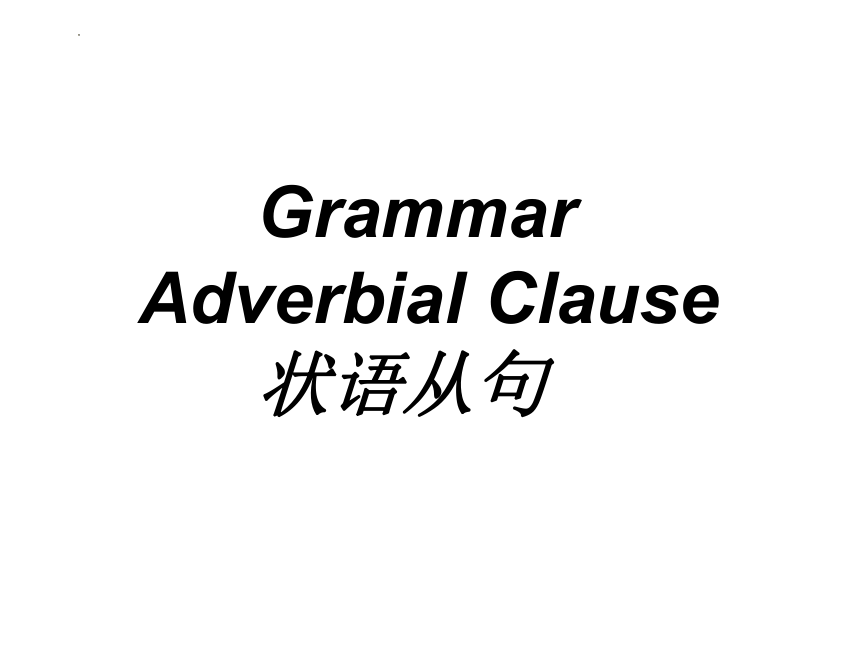 | |
| 格式 | pptx | ||
| 文件大小 | 240.7KB | ||
| 资源类型 | 教案 | ||
| 版本资源 | 通用版 | ||
| 科目 | 英语 | ||
| 更新时间 | 2022-02-27 17:32:25 | ||
图片预览

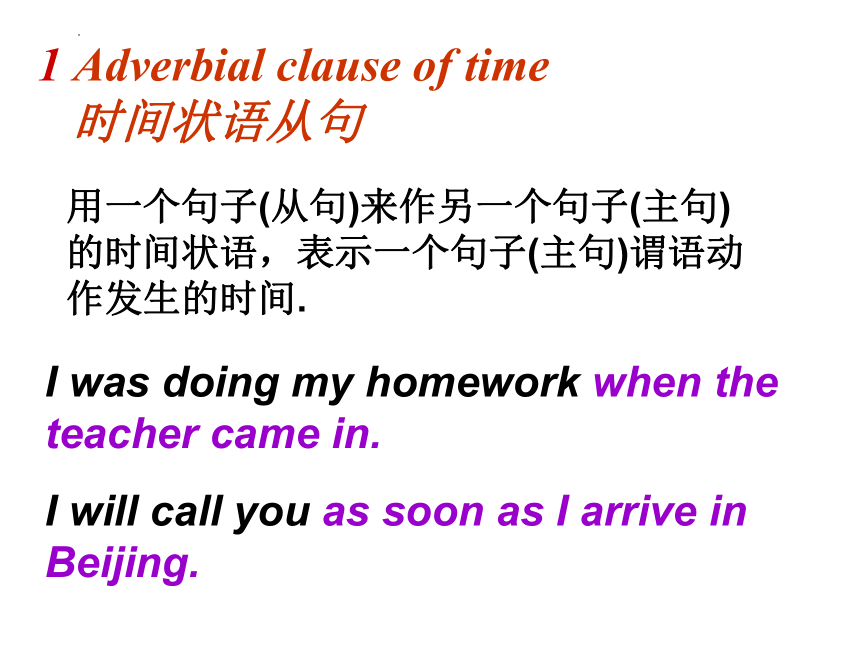
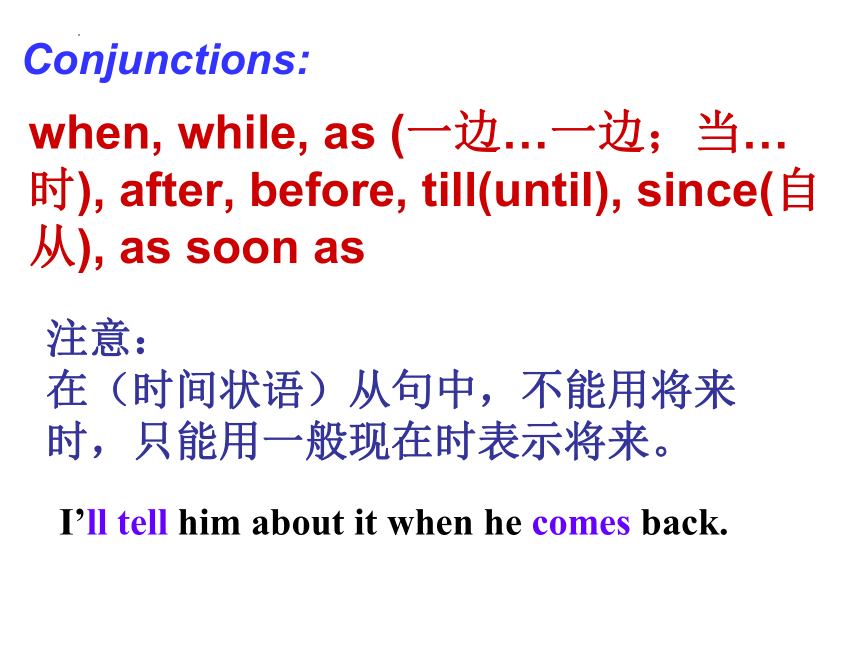
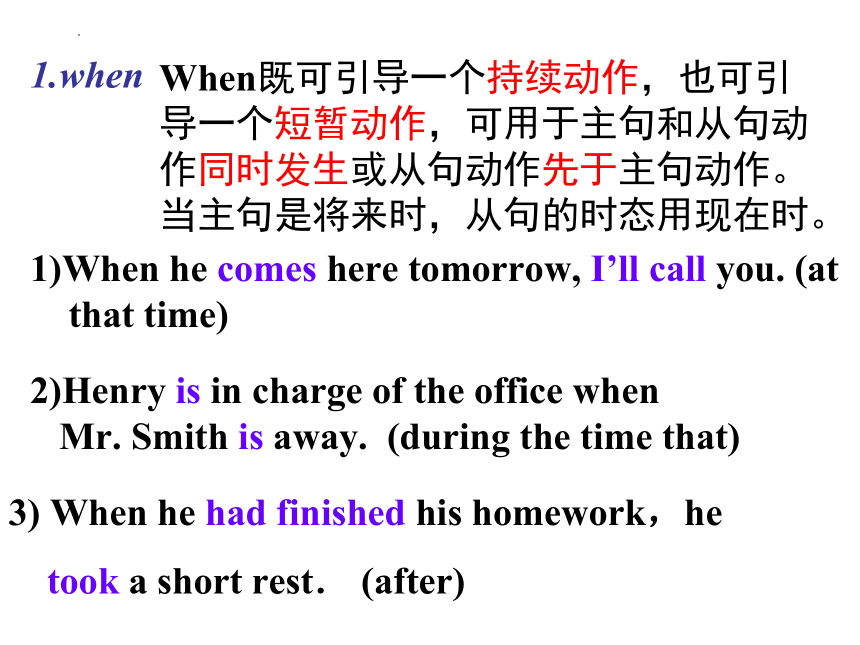
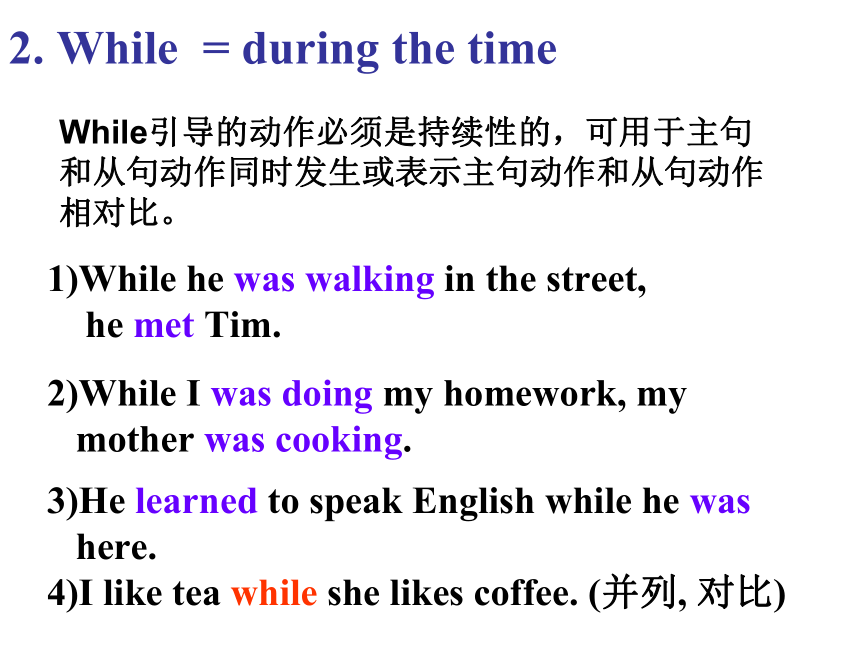
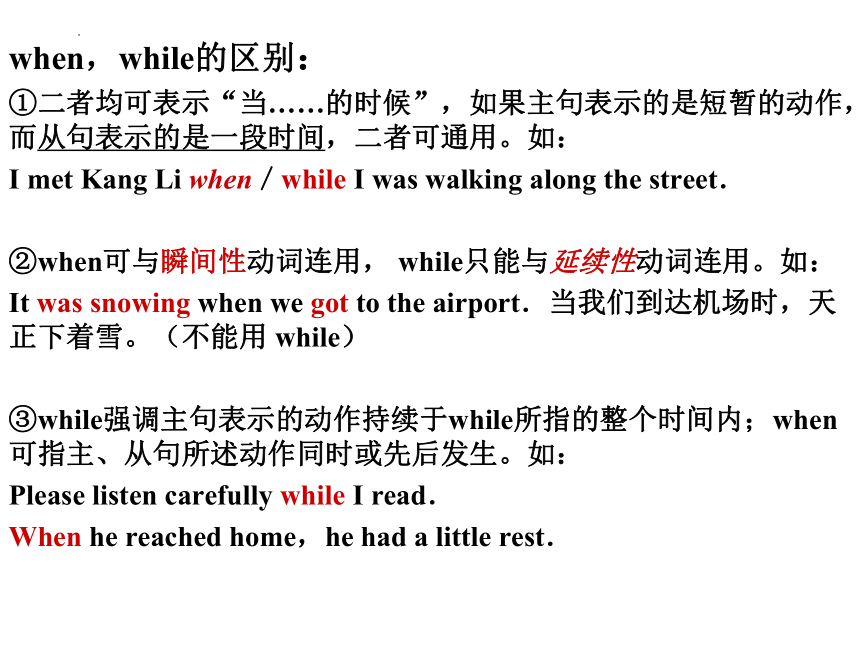
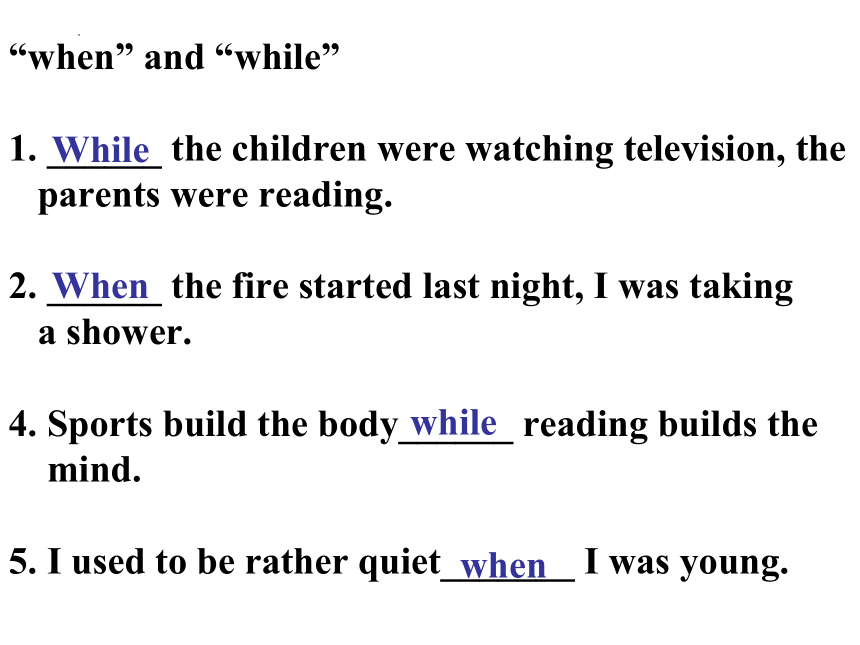
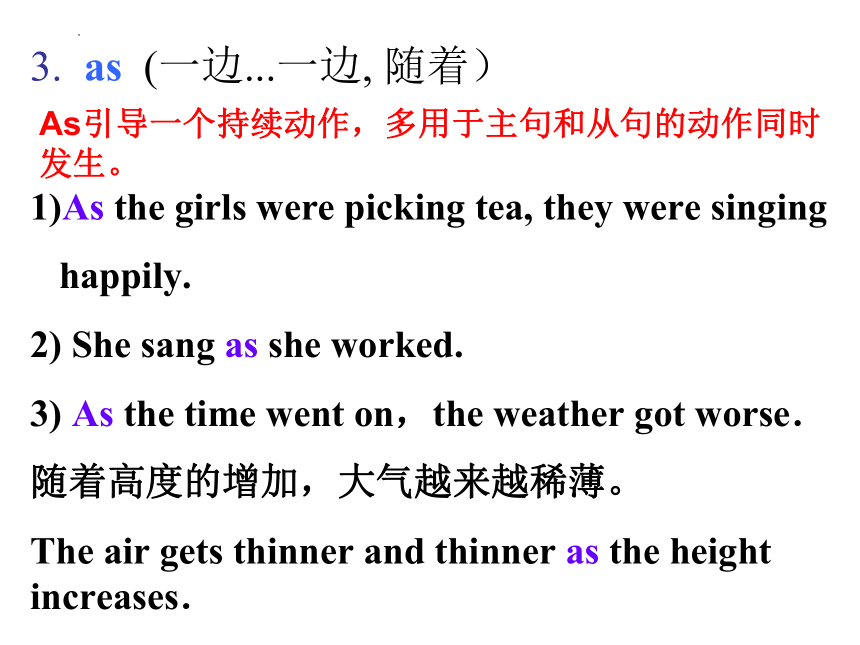
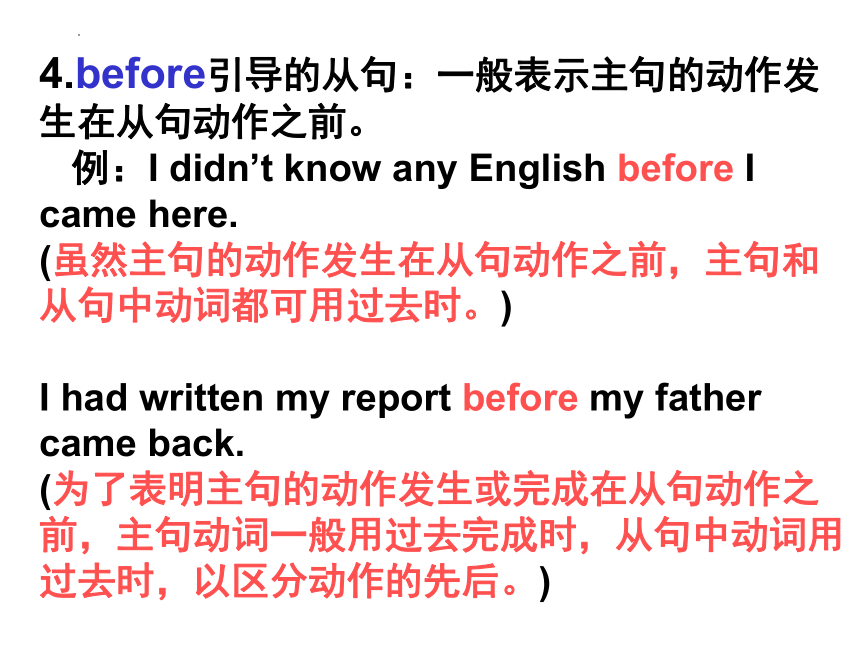
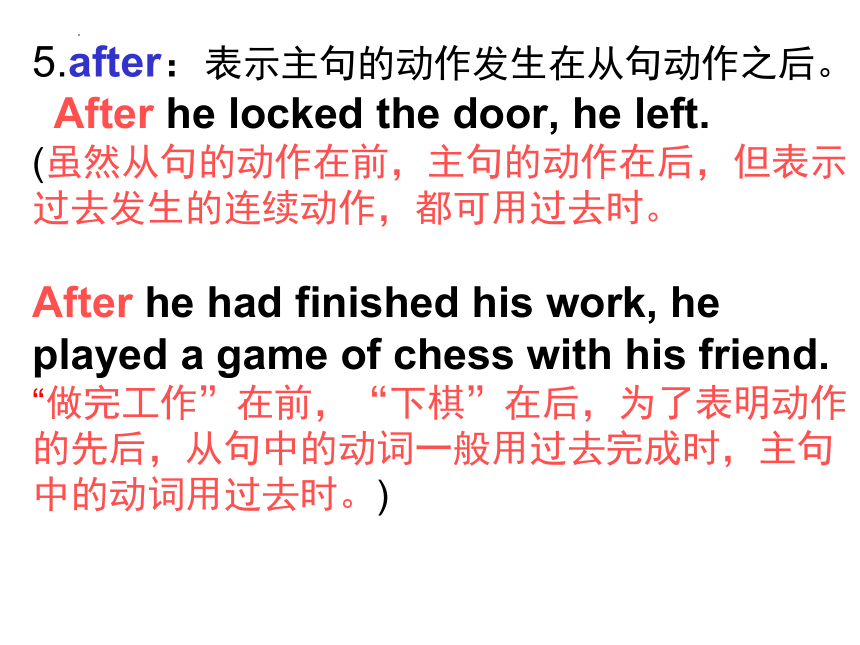
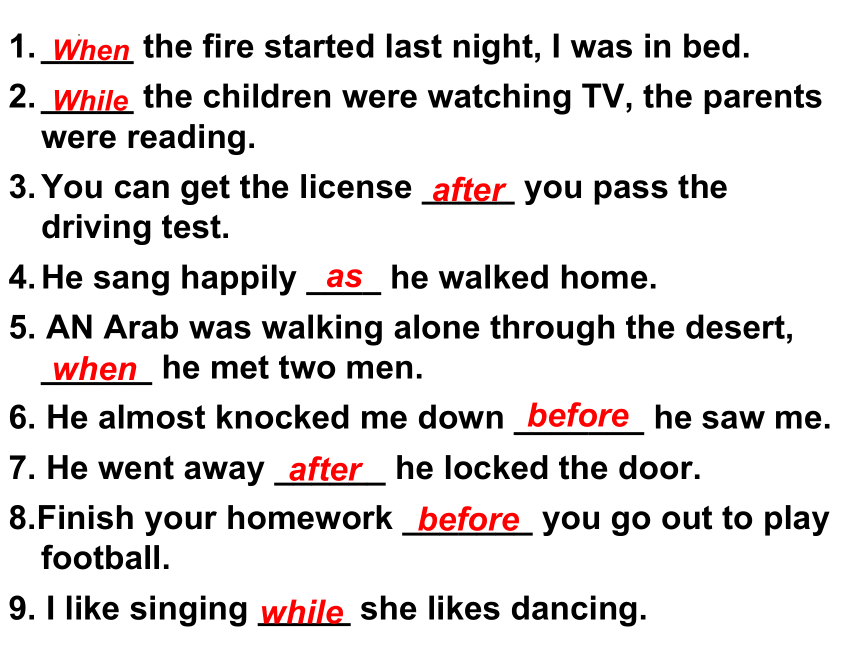
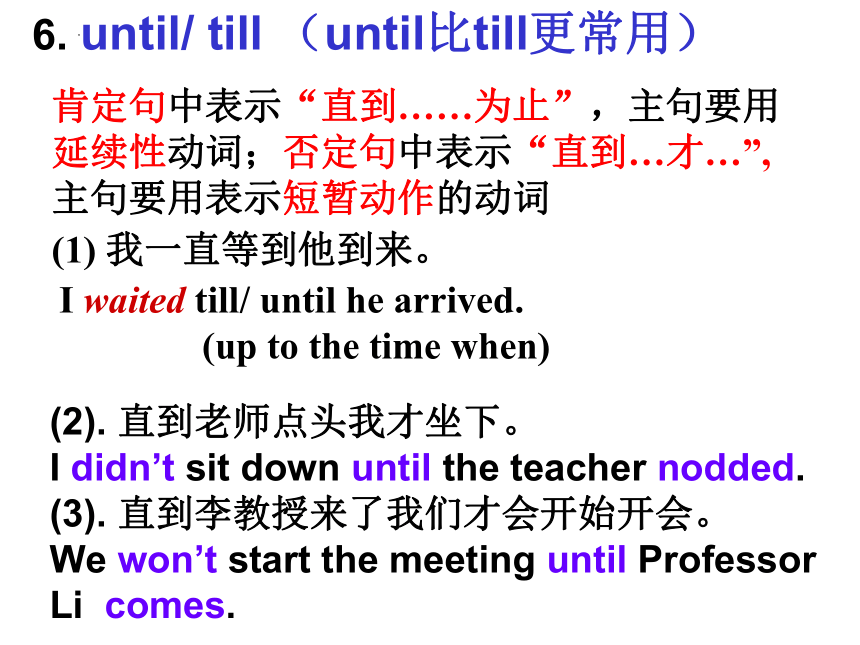
文档简介
(共58张PPT)
Grammar
Adverbial Clause
状语从句
用一个句子(从句)来作另一个句子(主句)的时间状语,表示一个句子(主句)谓语动作发生的时间.
1 Adverbial clause of time
时间状语从句
I was doing my homework when the teacher came in.
I will call you as soon as I arrive in Beijing.
when, while, as (一边…一边;当…时), after, before, till(until), since(自从), as soon as
注意:
在(时间状语)从句中,不能用将来
时,只能用一般现在时表示将来。
I’ll tell him about it when he comes back.
Conjunctions:
1)When he comes here tomorrow, I’ll call you. (at
that time)
1.when
2)Henry is in charge of the office when
Mr. Smith is away. (during the time that)
3) When he had finished his homework,he
took a short rest. (after)
When既可引导一个持续动作,也可引导一个短暂动作,可用于主句和从句动作同时发生或从句动作先于主句动作。当主句是将来时,从句的时态用现在时。
1)While he was walking in the street,
he met Tim.
3)He learned to speak English while he was
here.
4)I like tea while she likes coffee. (并列, 对比)
2. While = during the time
While引导的动作必须是持续性的,可用于主句和从句动作同时发生或表示主句动作和从句动作相对比。
2)While I was doing my homework, my
mother was cooking.
when,while的区别:
①二者均可表示“当……的时候”,如果主句表示的是短暂的动作,而从句表示的是一段时间,二者可通用。如:
I met Kang Li when/while I was walking along the street.
②when可与瞬间性动词连用, while只能与延续性动词连用。如:
It was snowing when we got to the airport.当我们到达机场时,天正下着雪。(不能用 while)
③while强调主句表示的动作持续于while所指的整个时间内;when可指主、从句所述动作同时或先后发生。如:
Please listen carefully while I read.
When he reached home,he had a little rest.
“when” and “while”
1. ______ the children were watching television, the
parents were reading.
2. ______ the fire started last night, I was taking
a shower.
4. Sports build the body______ reading builds the
mind.
5. I used to be rather quiet_______ I was young.
While
When
when
while
3. as (一边...一边, 随着)
1)As the girls were picking tea, they were singing
happily.
2) She sang as she worked.
3) As the time went on,the weather got worse.
随着高度的增加,大气越来越稀薄。
The air gets thinner and thinner as the height increases.
As引导一个持续动作,多用于主句和从句的动作同时发生。
4.before引导的从句:一般表示主句的动作发生在从句动作之前。
例:I didn’t know any English before I came here.
(虽然主句的动作发生在从句动作之前,主句和从句中动词都可用过去时。)
I had written my report before my father came back.
(为了表明主句的动作发生或完成在从句动作之前,主句动词一般用过去完成时,从句中动词用过去时,以区分动作的先后。)
5.after:表示主句的动作发生在从句动作之后。
After he locked the door, he left.
(虽然从句的动作在前,主句的动作在后,但表示过去发生的连续动作,都可用过去时。
After he had finished his work, he played a game of chess with his friend.
“做完工作”在前,“下棋”在后,为了表明动作的先后,从句中的动词一般用过去完成时,主句
中的动词用过去时。)
_____ the fire started last night, I was in bed.
_____ the children were watching TV, the parents were reading.
You can get the license _____ you pass the driving test.
He sang happily ____ he walked home.
5. AN Arab was walking alone through the desert, ______ he met two men.
6. He almost knocked me down _______ he saw me.
7. He went away ______ he locked the door.
8.Finish your homework _______ you go out to play football.
9. I like singing _____ she likes dancing.
When
While
after
as
when
before
after
before
while
肯定句中表示“直到……为止”,主句要用延续性动词;否定句中表示“直到…才…”, 主句要用表示短暂动作的动词
6. until/ till (until比till更常用)
(1) 我一直等到他到来。
I waited till/ until he arrived.
(up to the time when)
(2). 直到老师点头我才坐下。
I didn’t sit down until the teacher nodded.
(3). 直到李教授来了我们才会开始开会。
We won’t start the meeting until Professor Li comes.
(4)直到我爸爸回来我才去睡觉.
I didn’t go to bed until my father came back.
=I didn’t go to bed before my father came back.
=After my father came back, I went to bed.
注意:1. Till不可以置于句首,而until可以。
Until my father came back, I didn’t go to bed.
直到你告诉我以前,出了什么事我一点也不知道
Until you told me, I had heard nothing of what
happened.
7 since 引导的时间状语从句,“自从……以来”,主句常用现在完成时,从句常用一般过去时。
We have made many dumplings since we began to cook .
We haven’t seen each other since we separated .
注:常用句型:It is +时间段+since从句 译为:自从……有多长时间了。
It is six years since she graduated from the university . = Six years has passed since she graduated from the university.
8. as soon as : “一……就……”
(1)他一到那儿,就会去看你。
He will go to see you as soon as he gets here .
(2)她一到学校就把一切都准备好了。
She wrote to me as soon as she got to the university.
(3)我一到深圳立刻就给父母打电话。
I called my parents as soon as I arrived in Shenzhen.
I haven't heard from him _____ he went to America.
2. The police found the child two days _____ he was lost.
3. I won’t give up _____ the last minute.
4. She sang ____ she went along.
5. He will call you __________ he arrives in Japan.
6. Do not leave the room _____________ you
have finished the test.
Fill in the blanks with since , after, until, as , before, as soon as.
since
after
until
as
before/until
as soon as
翻译下列句子:
1 他们一直工作到天黑。
They worked until/ till it was late.
2 她一直到写完作业才睡觉。
She didn't go to bed until she finished her homework.
3 离开房间前关上门。
Close the door before you leave the room.
4 完成作业后我就去睡觉了。
I went to bed after I (had) finished my homework.
5 自从遇见了这个好朋友,他已在学习上取得
了巨大的进步
Since he met this good friend, he has
made great progress in his studies.
6 她入党二十年了。
It is twenty years since she joined the
Party.
7 上课铃声一响,你们就必须马上进教室。
You must enter the classroom as soon
as the bell for class rings.
8 不要边吃饭边看电视。
Don’t watch TV as you are eating.
1.hardly /scarcely/ rarely…when , no sooner…than相当于as soon as之意。主句用过去完成时,从句用一般过去时。
当hardly, scarcely, rarely和no sooner位于句首时,主句应用倒装语序。
1).He had no sooner arrived home than he was asked to
start another trip.
No sooner had he arrived home he was asked to start
another trip.
2).I had hardly sat down when he stepped in.
Hardy had I sat down when he stepped in.
More to learn
2. not until置于句首,主句要倒装
I didn’t go to bed until my father came back.
Not until my father came back did I go to bed.
I didn’t sit down until the teacher nodded
Not until the teacher nodded did I sit down.
We won’t start the meeting until Professor Li comes.
Not until Professor comes will we start the meeting.
I didn’t realize how much time I had wasted until I began to work.
Not until I began to work did I realize how much time I had wasted.
3 by the time 到…时候, 到…之前
注意时态的变化:
如果从句的谓语动词用一般过去时,主句的谓语动词用过去完成时;
By the time you came back, I had finished this book. 到你回来时,我已经写完这本书了。
By the time I got outside, the bus _____ already _____.(leave)
By the time I arrived at school, the bell _________(ring)
By the time I walked into class, the teacher ____________ teaching .(start)
had
left
had rung
had started
如果从句的谓语动词用一般现在时,主句的谓语动词用将来完成时。如:
By the time you come here tomorrow, I will have finished this work.
你明天来这儿的时候,我将已经完成此工作了。
2 Adverbial Clauses of Condition
条件状语从句
Conjunctions: if, unless = if…not, as long as
1) 除非你更努力学习, (否则)你有可能考试不及格。
You may not pass the exam unless you work
harder.
You may fail (in) the exam if you don’t work
harder.
2) 只要我们付出更大的努力, 我们就能成功。
We’ll succeed as(so) long as we make greater
efforts.
在一定的条件下,可能发生的结果. 主句时态用将来时,
从句用一般现在时.
1 Actions having results that will probably happen
If your friend tells you a phone number, you
will probably remember it for a short time.
If it rains tomorrow, we won’t go to the zoo.
注意:条件状语从句不能用将来时,要用一般现在时代替。
If it doesn’t rain next Saturday, we’ll go for a picnic.
2 unless: if…not
除非,如果不
1)The employees won’t go home unless
they finish doing all the work.
The employees won’t go home if they
don’t finish doing all the work.
2)The baby won’t go to sleep unless her
mother tells a story.
The baby won’t go to sleep if her
mother doesn’t tell a story.
3 在“祈使句+and/or+ 陈述句” 这个表示结果的并列句中,祈使句在意义上相当于一个条件状语从句。
1) Use your head, and you’ll find a way.
If you use your head, you’ll find a way.
2) Hurry up, or you’ll miss the plane.
If you don’t hurry up , you won’t catch
the plane.
1. If you check your timetable every night, you __________(know) which books to bring .
2. If you keep your brain active, you __________ (think ) faster.
3. If you use silly pictures to imagine words, you __________(have) more fun learning English.
4. If you ask your friends, they ________( help) you.
5 . If you do not try harder, I ____________(not give) you a good report.
Fill in the blanks.
will know
will think
will have
will help
won’t give
If you don’t clean the room, I __________(not let) you go to the party.
If you climb up the mountain, you _________( see) a beautiful castle.
If you wear a coat , you ___________(not get) sick .
If you take the pills, you _________(get) better.
10. If it _____________(not rain) tomorrow, I will go to the park.
11. Unless it ______(rain), the crops will die.
12. You won’t enter a good school unless you ______ good marks in the entrance examination.
won’t let
will see
won’t get
will get
doesn’t rain
rains
get
Complete the sentence.
If I get up late tomorrow, ________________.
2. If I don’t finish my homework, _______________
______________.
3. If I eat too much, ________________.
4. If I don’t get enough exercise, _____________.
5. If I don’t pass the entrance exam for high school, ____________.
6. If I watch too much TV, ____________________.
7. If I don’t help others, ____________________.
8. Unless you stop smoking, ___________________.
9. Unless you take a taxi, _____________________.
I will miss the bus
I will be punished
by the teacher
I will become fat
I will get sick
I will be sad
I will be near-sighted
I will have no friends
I will have lung cancer
you’ll be late for school
You won’t improve your memory if you don’t use “picture” method.
It will be harder to revise new words if you don’t use a vocabulary notebook.
You won’t remember the facts if you don’t listen carefully.
You won’t improve your memory unless you use the picture method.
It will be harder to revise new words unless you use a vocabulary notebook.
You won’t remember the facts unless you listen carefully.
Rewrite the sentences with “unless”
1. Do some sports, and you’ll be healthy.
2. If you study hard , you will catch up
with your classmates.
If you do some sports, you will be healthy.
Study hard, or you’ll fall behind your classmates.
Paraphrase the following sentences.
3. Don’t stay up late, or you’ll be sleepy
tomorrow.
If you stay up late, you’ll be sleepy tomorrow .
4 The more careful you are, the fewer
mistakes you’ll make.
5 The less you eat, the thinner you’ll become.
If you are more careful, you’ll make fewer mistakes.
If you eat less, you’ll become thinner.
条件句有两类,一类是真实条件句,一类是虚拟条件句。如果假设的情况是有可能发生的,就是真实条件句。在这种真实条件句中的谓语用陈述语气。
If it doesn’t rain tomorrow, we will go to the park.
如果假设的情况是过去或现在都不存在的,则是虚拟条件句。
If he had seen you yesterday, he would have asked you about it.
More to learn:
虚拟语气结构
1. 与现在事实相反:
从句( 动词的过去式) +主句(would/ should/ could/ might + 动词原形)
(be的过去式一般用were)
If my brother were here, everything would be all right.
If I were you, I would agree to his plan.
2. 与过去事实相反
从句(had + 过去分词 ) +主句(would/ should/ could/ might + have + 过去分词)
If you had taken my advice,you wouldn't have failed in the exam.
More to learn
3 Adverbial clause of result
结果状语从句
Conjunctions: so…that, such…that, so that
(如此…以致于)(结果是)
1) 他走得那么快以至于我跟不上他。
He walked so fast that I could not follow him.
2) 她取得了如此大的进步以至于获得第一名。
She made such great progress that she won the
first place.
3) 今天早上我起晚了结果错过了早班车。
I got up late this morning so that I missed the
early bus.
so+形容词/副词+that
so+形容词+a/an+单数可数名词+that
such a/an +形容词+单数可数名词+ that
such+形容词+复数可数名词/不可数名词+that
(如果不可数名词和可数名词复数由little(少), much, few, many修饰时,用so不用such
2.She’s so lovely a girl that everybody likes her.
3.She’s such a lovely girl that everybody likes her.
4.They’re such lovely girls that everybody like them.
5.It’s such delicious soup that I want to drink some more.
6.I have so little money that I can’t buy anything.
7.There are so many flowers that we give some to
strangers.
It was such a wonderful film that all of us wanted to see it again.
The match is so important that nobody wants to miss it.
The film was so wonderful that all of us wanted to see it again.
It is such an important match that nobody wants to miss it.
It is so important a match that nobody...
3 He is so weak that he can’t go out alone.
He is too weak to go out alone.
He is not strong enough to go out alone.
Paraphrase
4. Adverbial Clauses of Purpose: 目的状语从句
Conjunctions: so that , in order that
注意:从句通常可以用can/ could/ may/ might等情态动词+原形动词做谓语)
他大声地说话,以便每个人都能听见。
He spoke in a loud voice so that /in order that everybody could hear him.
2) 她起床很早, 以便她能赶上飞机。
She got up early so that /in order that she
could catch the plane .
当主句和从句的主语一致时, 可用 in order to /so as to
Paraphrase the following sentences.
1 He worked day and night in order that he
could succeed.
2 He drove quickly so that he could send his sick
daughter to the hospital as soon as possible.
3 They took a taxi in order that they would not
be late for the meeting.
He worked day and night in order to succeed.
He drove quickly so as to send his sick daughter
to the hospital as soon as possible.
They took a taxi so as not to be late for the meeting.
Adverbial clause of comparison
比较状语从句
Conjunctions: than, as…as, not as/so…as, the same …as
1) He cleans the room as carefully as his sister.
2) He doesn’t clean the room as/so carefully as
his sister.
3) He cleans the room more carefully than his
sister.
4) He cleans the room less carefully than his
sister.
5) He is as careless as his brother.
1) He is as tall as his father.
He is the same height as his father.
2) He is the same weight as Peter.
He is as heavy as Peter
3) He is the same age as I.
He is as old as I.
4) My house is twice as large as his.
My house is once larger than his.
Paraphrase
Paraphrase
6) The rope is three times as long as that one.
The rope is twice longer than that one.
The rope is three times the length of that one.
7) The song is more popular than any other one .
The song is the most popular one.
No other song is more popular than this one.
8) Lily didn’t do the experiment as carefully as
Lucy.
Lily did the experiment more carelessly than Lucy.
Lucy did the experiment more carefully than Lily.
6 Adverbial clause of concession:
让步状语从句
Conjunctions:
although, though,while, as, even if, even though, no matter+疑问词, 疑问词+ever, despite
尽管我不想考试不及格, 可我还是没及格。
I failed in the exam although I didn’t want to.
需要记住的要点:
although 和though都可以引导让步状语从句, 从句在主句之前,从句和主句之间要有逗号隔开,从句在主句之后,两句之间则没有逗号。
1) Although/Though she was unprepared, she did quite well in the exam.
She did quite well in the exam although/ though she was unprepared.
2. 特别要注意的是:在同一句话中,although 和though不可以和but同时使用. 但是他们可以和yet一起使用。
1) Although she was nervous, but she kept getting the questions right. ( X )
2) Though she was nervous, (yet) she kept getting the questions right.( )
3) She was nervous, but she kept getting the questions right.( )
3. Though引导让步状语从句时, 可以用 although替换, 但它也可以做副词用,放在句子的末尾表示“然而”, 这时不能用although替换它。
They went to the Information Centre for help. It was closed, though. ( )
They went to the Information Centre for help. It was closed, although. (X)
2) It is hard work, I enjoy it, though. ( )
It is hard work, I enjoy it, although. ( X )
3) He said he would come, he didn’t, though. ( )
He said he would come, he didn’t, although.( X )
4. even though = even if = although
纵然,即使…(承认某事是真实的或许会发生时使用)
1) 即使我得一路走着去, 我也要走到那里.
Even if/though I have to walk all the way, I will get there.
2) 即使她有时很讨厌, 她父母还是爱她.
Her parents still love her even if/though she can be annoying.
3) 即使你看到他把进过办公室, 你也未必就能肯定钱是他偷的.
Even if/though you saw him enter the office, you can’t be sure he stole the money.
4) 即使我今晚有空,我也不跟你去看电影.
I won’t go to the cinema with you even if/though I am free tonight.
7 Adverbial clause of reason:
原因状语从句
Conjunctions: because, since, as, for, now that
Because I had a headache, I missed the English class.
2) Since/As the weather is bad, we have to put off the sports meet.
3) You should learn to take care of yourself, for you are not a child any more.
Because语气最强,用来说明不为人所知的原因,回答why提出的问题。当原因是显而易见或已为人们所知时,就用as或 since,另外 for也可以表示已为人所知的原因,但往往放在主句后面,用逗号隔开; because/ since/ as 引导的从句在主句之前时,也要与主句用逗号隔开。
①The Differences
I didn’t attend the meeting because I was ill.
More to learn
I was ill, so I didn’t take part in the meeting.
Since/As the weather was so bad, the sports meeting had to be put off.
Since/As everybody is here, let’s begin our meeting.
Since you are not interested, I won’t tell you about it.
The days are short, for it is December now.
We needn’t go to school today, for it is Saturday.
As you are tired, you had better have a rest.
It is three years since I last saw him.(自从)
I haven’t seen him since three years ago.
They have been friends since childhood.
I dropped my glass as I stood up.(当…的时候)
Please do as I told you.(按照)
She sang as she worked.(一边…一边)
The city is the same as it was before.(与…一样)
They have been friends since they were children.
8 Adverbial clause of place: 地点状语从句
Conjunctions: where, wherever(无论何地),
everywhere, anywhere
1) Sit wherever you like.
坐任何你喜欢坐的地方。
2) Where there is a will, there is a way.
有志者事竟成。
3) Where I live, there are plenty of trees and
flowers.
在我住的地方,有很多树木和花。
1 我在我原来放书包的地方找到了书包。
I found my bag where I had left it.
2 他在他父亲多年前工作过的地方上班。
He is working where his father worked
years ago.
3 不论你走到哪,我都会跟着你。
Wherever you go , I’ll follow you.
4 不论他在哪,他都会想起他的儿子。
Wherever he is, he’ll think of his son.
Translate the sentences.
注意地点状语从句和定语从句的区别.
I went where I was born yesterday.
I went to the village where I was born.
地点状语从句
定语从句
This is the factory where my father works.
定语从句
9 Adverbial clause of manner:
方式状语从句
Conjunctions: as, as if/though(仿佛)
1) 你必须按我说的去做.
You must do as I told you.
2) 他能象鱼儿一样游泳.
He can swim as fish (does).
3) 我多希望能象鸟儿一样飞啊!
How I wish I could fly as a bird!
4) 她看起来冷冰冰的就象冰做的一样.
She looked as if she were made of ice.
as if = as though
好像, 仿佛…(有某种迹象显示…)
1) 看他的举止好像什么也没有发生过似的.
He behaved as if/though nothing had happened.
2) 似乎这会议永远也不会结束似的.
It seemed as if/though the meeting would never end.
Grammar
Adverbial Clause
状语从句
用一个句子(从句)来作另一个句子(主句)的时间状语,表示一个句子(主句)谓语动作发生的时间.
1 Adverbial clause of time
时间状语从句
I was doing my homework when the teacher came in.
I will call you as soon as I arrive in Beijing.
when, while, as (一边…一边;当…时), after, before, till(until), since(自从), as soon as
注意:
在(时间状语)从句中,不能用将来
时,只能用一般现在时表示将来。
I’ll tell him about it when he comes back.
Conjunctions:
1)When he comes here tomorrow, I’ll call you. (at
that time)
1.when
2)Henry is in charge of the office when
Mr. Smith is away. (during the time that)
3) When he had finished his homework,he
took a short rest. (after)
When既可引导一个持续动作,也可引导一个短暂动作,可用于主句和从句动作同时发生或从句动作先于主句动作。当主句是将来时,从句的时态用现在时。
1)While he was walking in the street,
he met Tim.
3)He learned to speak English while he was
here.
4)I like tea while she likes coffee. (并列, 对比)
2. While = during the time
While引导的动作必须是持续性的,可用于主句和从句动作同时发生或表示主句动作和从句动作相对比。
2)While I was doing my homework, my
mother was cooking.
when,while的区别:
①二者均可表示“当……的时候”,如果主句表示的是短暂的动作,而从句表示的是一段时间,二者可通用。如:
I met Kang Li when/while I was walking along the street.
②when可与瞬间性动词连用, while只能与延续性动词连用。如:
It was snowing when we got to the airport.当我们到达机场时,天正下着雪。(不能用 while)
③while强调主句表示的动作持续于while所指的整个时间内;when可指主、从句所述动作同时或先后发生。如:
Please listen carefully while I read.
When he reached home,he had a little rest.
“when” and “while”
1. ______ the children were watching television, the
parents were reading.
2. ______ the fire started last night, I was taking
a shower.
4. Sports build the body______ reading builds the
mind.
5. I used to be rather quiet_______ I was young.
While
When
when
while
3. as (一边...一边, 随着)
1)As the girls were picking tea, they were singing
happily.
2) She sang as she worked.
3) As the time went on,the weather got worse.
随着高度的增加,大气越来越稀薄。
The air gets thinner and thinner as the height increases.
As引导一个持续动作,多用于主句和从句的动作同时发生。
4.before引导的从句:一般表示主句的动作发生在从句动作之前。
例:I didn’t know any English before I came here.
(虽然主句的动作发生在从句动作之前,主句和从句中动词都可用过去时。)
I had written my report before my father came back.
(为了表明主句的动作发生或完成在从句动作之前,主句动词一般用过去完成时,从句中动词用过去时,以区分动作的先后。)
5.after:表示主句的动作发生在从句动作之后。
After he locked the door, he left.
(虽然从句的动作在前,主句的动作在后,但表示过去发生的连续动作,都可用过去时。
After he had finished his work, he played a game of chess with his friend.
“做完工作”在前,“下棋”在后,为了表明动作的先后,从句中的动词一般用过去完成时,主句
中的动词用过去时。)
_____ the fire started last night, I was in bed.
_____ the children were watching TV, the parents were reading.
You can get the license _____ you pass the driving test.
He sang happily ____ he walked home.
5. AN Arab was walking alone through the desert, ______ he met two men.
6. He almost knocked me down _______ he saw me.
7. He went away ______ he locked the door.
8.Finish your homework _______ you go out to play football.
9. I like singing _____ she likes dancing.
When
While
after
as
when
before
after
before
while
肯定句中表示“直到……为止”,主句要用延续性动词;否定句中表示“直到…才…”, 主句要用表示短暂动作的动词
6. until/ till (until比till更常用)
(1) 我一直等到他到来。
I waited till/ until he arrived.
(up to the time when)
(2). 直到老师点头我才坐下。
I didn’t sit down until the teacher nodded.
(3). 直到李教授来了我们才会开始开会。
We won’t start the meeting until Professor Li comes.
(4)直到我爸爸回来我才去睡觉.
I didn’t go to bed until my father came back.
=I didn’t go to bed before my father came back.
=After my father came back, I went to bed.
注意:1. Till不可以置于句首,而until可以。
Until my father came back, I didn’t go to bed.
直到你告诉我以前,出了什么事我一点也不知道
Until you told me, I had heard nothing of what
happened.
7 since 引导的时间状语从句,“自从……以来”,主句常用现在完成时,从句常用一般过去时。
We have made many dumplings since we began to cook .
We haven’t seen each other since we separated .
注:常用句型:It is +时间段+since从句 译为:自从……有多长时间了。
It is six years since she graduated from the university . = Six years has passed since she graduated from the university.
8. as soon as : “一……就……”
(1)他一到那儿,就会去看你。
He will go to see you as soon as he gets here .
(2)她一到学校就把一切都准备好了。
She wrote to me as soon as she got to the university.
(3)我一到深圳立刻就给父母打电话。
I called my parents as soon as I arrived in Shenzhen.
I haven't heard from him _____ he went to America.
2. The police found the child two days _____ he was lost.
3. I won’t give up _____ the last minute.
4. She sang ____ she went along.
5. He will call you __________ he arrives in Japan.
6. Do not leave the room _____________ you
have finished the test.
Fill in the blanks with since , after, until, as , before, as soon as.
since
after
until
as
before/until
as soon as
翻译下列句子:
1 他们一直工作到天黑。
They worked until/ till it was late.
2 她一直到写完作业才睡觉。
She didn't go to bed until she finished her homework.
3 离开房间前关上门。
Close the door before you leave the room.
4 完成作业后我就去睡觉了。
I went to bed after I (had) finished my homework.
5 自从遇见了这个好朋友,他已在学习上取得
了巨大的进步
Since he met this good friend, he has
made great progress in his studies.
6 她入党二十年了。
It is twenty years since she joined the
Party.
7 上课铃声一响,你们就必须马上进教室。
You must enter the classroom as soon
as the bell for class rings.
8 不要边吃饭边看电视。
Don’t watch TV as you are eating.
1.hardly /scarcely/ rarely…when , no sooner…than相当于as soon as之意。主句用过去完成时,从句用一般过去时。
当hardly, scarcely, rarely和no sooner位于句首时,主句应用倒装语序。
1).He had no sooner arrived home than he was asked to
start another trip.
No sooner had he arrived home he was asked to start
another trip.
2).I had hardly sat down when he stepped in.
Hardy had I sat down when he stepped in.
More to learn
2. not until置于句首,主句要倒装
I didn’t go to bed until my father came back.
Not until my father came back did I go to bed.
I didn’t sit down until the teacher nodded
Not until the teacher nodded did I sit down.
We won’t start the meeting until Professor Li comes.
Not until Professor comes will we start the meeting.
I didn’t realize how much time I had wasted until I began to work.
Not until I began to work did I realize how much time I had wasted.
3 by the time 到…时候, 到…之前
注意时态的变化:
如果从句的谓语动词用一般过去时,主句的谓语动词用过去完成时;
By the time you came back, I had finished this book. 到你回来时,我已经写完这本书了。
By the time I got outside, the bus _____ already _____.(leave)
By the time I arrived at school, the bell _________(ring)
By the time I walked into class, the teacher ____________ teaching .(start)
had
left
had rung
had started
如果从句的谓语动词用一般现在时,主句的谓语动词用将来完成时。如:
By the time you come here tomorrow, I will have finished this work.
你明天来这儿的时候,我将已经完成此工作了。
2 Adverbial Clauses of Condition
条件状语从句
Conjunctions: if, unless = if…not, as long as
1) 除非你更努力学习, (否则)你有可能考试不及格。
You may not pass the exam unless you work
harder.
You may fail (in) the exam if you don’t work
harder.
2) 只要我们付出更大的努力, 我们就能成功。
We’ll succeed as(so) long as we make greater
efforts.
在一定的条件下,可能发生的结果. 主句时态用将来时,
从句用一般现在时.
1 Actions having results that will probably happen
If your friend tells you a phone number, you
will probably remember it for a short time.
If it rains tomorrow, we won’t go to the zoo.
注意:条件状语从句不能用将来时,要用一般现在时代替。
If it doesn’t rain next Saturday, we’ll go for a picnic.
2 unless: if…not
除非,如果不
1)The employees won’t go home unless
they finish doing all the work.
The employees won’t go home if they
don’t finish doing all the work.
2)The baby won’t go to sleep unless her
mother tells a story.
The baby won’t go to sleep if her
mother doesn’t tell a story.
3 在“祈使句+and/or+ 陈述句” 这个表示结果的并列句中,祈使句在意义上相当于一个条件状语从句。
1) Use your head, and you’ll find a way.
If you use your head, you’ll find a way.
2) Hurry up, or you’ll miss the plane.
If you don’t hurry up , you won’t catch
the plane.
1. If you check your timetable every night, you __________(know) which books to bring .
2. If you keep your brain active, you __________ (think ) faster.
3. If you use silly pictures to imagine words, you __________(have) more fun learning English.
4. If you ask your friends, they ________( help) you.
5 . If you do not try harder, I ____________(not give) you a good report.
Fill in the blanks.
will know
will think
will have
will help
won’t give
If you don’t clean the room, I __________(not let) you go to the party.
If you climb up the mountain, you _________( see) a beautiful castle.
If you wear a coat , you ___________(not get) sick .
If you take the pills, you _________(get) better.
10. If it _____________(not rain) tomorrow, I will go to the park.
11. Unless it ______(rain), the crops will die.
12. You won’t enter a good school unless you ______ good marks in the entrance examination.
won’t let
will see
won’t get
will get
doesn’t rain
rains
get
Complete the sentence.
If I get up late tomorrow, ________________.
2. If I don’t finish my homework, _______________
______________.
3. If I eat too much, ________________.
4. If I don’t get enough exercise, _____________.
5. If I don’t pass the entrance exam for high school, ____________.
6. If I watch too much TV, ____________________.
7. If I don’t help others, ____________________.
8. Unless you stop smoking, ___________________.
9. Unless you take a taxi, _____________________.
I will miss the bus
I will be punished
by the teacher
I will become fat
I will get sick
I will be sad
I will be near-sighted
I will have no friends
I will have lung cancer
you’ll be late for school
You won’t improve your memory if you don’t use “picture” method.
It will be harder to revise new words if you don’t use a vocabulary notebook.
You won’t remember the facts if you don’t listen carefully.
You won’t improve your memory unless you use the picture method.
It will be harder to revise new words unless you use a vocabulary notebook.
You won’t remember the facts unless you listen carefully.
Rewrite the sentences with “unless”
1. Do some sports, and you’ll be healthy.
2. If you study hard , you will catch up
with your classmates.
If you do some sports, you will be healthy.
Study hard, or you’ll fall behind your classmates.
Paraphrase the following sentences.
3. Don’t stay up late, or you’ll be sleepy
tomorrow.
If you stay up late, you’ll be sleepy tomorrow .
4 The more careful you are, the fewer
mistakes you’ll make.
5 The less you eat, the thinner you’ll become.
If you are more careful, you’ll make fewer mistakes.
If you eat less, you’ll become thinner.
条件句有两类,一类是真实条件句,一类是虚拟条件句。如果假设的情况是有可能发生的,就是真实条件句。在这种真实条件句中的谓语用陈述语气。
If it doesn’t rain tomorrow, we will go to the park.
如果假设的情况是过去或现在都不存在的,则是虚拟条件句。
If he had seen you yesterday, he would have asked you about it.
More to learn:
虚拟语气结构
1. 与现在事实相反:
从句( 动词的过去式) +主句(would/ should/ could/ might + 动词原形)
(be的过去式一般用were)
If my brother were here, everything would be all right.
If I were you, I would agree to his plan.
2. 与过去事实相反
从句(had + 过去分词 ) +主句(would/ should/ could/ might + have + 过去分词)
If you had taken my advice,you wouldn't have failed in the exam.
More to learn
3 Adverbial clause of result
结果状语从句
Conjunctions: so…that, such…that, so that
(如此…以致于)(结果是)
1) 他走得那么快以至于我跟不上他。
He walked so fast that I could not follow him.
2) 她取得了如此大的进步以至于获得第一名。
She made such great progress that she won the
first place.
3) 今天早上我起晚了结果错过了早班车。
I got up late this morning so that I missed the
early bus.
so+形容词/副词+that
so+形容词+a/an+单数可数名词+that
such a/an +形容词+单数可数名词+ that
such+形容词+复数可数名词/不可数名词+that
(如果不可数名词和可数名词复数由little(少), much, few, many修饰时,用so不用such
2.She’s so lovely a girl that everybody likes her.
3.She’s such a lovely girl that everybody likes her.
4.They’re such lovely girls that everybody like them.
5.It’s such delicious soup that I want to drink some more.
6.I have so little money that I can’t buy anything.
7.There are so many flowers that we give some to
strangers.
It was such a wonderful film that all of us wanted to see it again.
The match is so important that nobody wants to miss it.
The film was so wonderful that all of us wanted to see it again.
It is such an important match that nobody wants to miss it.
It is so important a match that nobody...
3 He is so weak that he can’t go out alone.
He is too weak to go out alone.
He is not strong enough to go out alone.
Paraphrase
4. Adverbial Clauses of Purpose: 目的状语从句
Conjunctions: so that , in order that
注意:从句通常可以用can/ could/ may/ might等情态动词+原形动词做谓语)
他大声地说话,以便每个人都能听见。
He spoke in a loud voice so that /in order that everybody could hear him.
2) 她起床很早, 以便她能赶上飞机。
She got up early so that /in order that she
could catch the plane .
当主句和从句的主语一致时, 可用 in order to /so as to
Paraphrase the following sentences.
1 He worked day and night in order that he
could succeed.
2 He drove quickly so that he could send his sick
daughter to the hospital as soon as possible.
3 They took a taxi in order that they would not
be late for the meeting.
He worked day and night in order to succeed.
He drove quickly so as to send his sick daughter
to the hospital as soon as possible.
They took a taxi so as not to be late for the meeting.
Adverbial clause of comparison
比较状语从句
Conjunctions: than, as…as, not as/so…as, the same …as
1) He cleans the room as carefully as his sister.
2) He doesn’t clean the room as/so carefully as
his sister.
3) He cleans the room more carefully than his
sister.
4) He cleans the room less carefully than his
sister.
5) He is as careless as his brother.
1) He is as tall as his father.
He is the same height as his father.
2) He is the same weight as Peter.
He is as heavy as Peter
3) He is the same age as I.
He is as old as I.
4) My house is twice as large as his.
My house is once larger than his.
Paraphrase
Paraphrase
6) The rope is three times as long as that one.
The rope is twice longer than that one.
The rope is three times the length of that one.
7) The song is more popular than any other one .
The song is the most popular one.
No other song is more popular than this one.
8) Lily didn’t do the experiment as carefully as
Lucy.
Lily did the experiment more carelessly than Lucy.
Lucy did the experiment more carefully than Lily.
6 Adverbial clause of concession:
让步状语从句
Conjunctions:
although, though,while, as, even if, even though, no matter+疑问词, 疑问词+ever, despite
尽管我不想考试不及格, 可我还是没及格。
I failed in the exam although I didn’t want to.
需要记住的要点:
although 和though都可以引导让步状语从句, 从句在主句之前,从句和主句之间要有逗号隔开,从句在主句之后,两句之间则没有逗号。
1) Although/Though she was unprepared, she did quite well in the exam.
She did quite well in the exam although/ though she was unprepared.
2. 特别要注意的是:在同一句话中,although 和though不可以和but同时使用. 但是他们可以和yet一起使用。
1) Although she was nervous, but she kept getting the questions right. ( X )
2) Though she was nervous, (yet) she kept getting the questions right.( )
3) She was nervous, but she kept getting the questions right.( )
3. Though引导让步状语从句时, 可以用 although替换, 但它也可以做副词用,放在句子的末尾表示“然而”, 这时不能用although替换它。
They went to the Information Centre for help. It was closed, though. ( )
They went to the Information Centre for help. It was closed, although. (X)
2) It is hard work, I enjoy it, though. ( )
It is hard work, I enjoy it, although. ( X )
3) He said he would come, he didn’t, though. ( )
He said he would come, he didn’t, although.( X )
4. even though = even if = although
纵然,即使…(承认某事是真实的或许会发生时使用)
1) 即使我得一路走着去, 我也要走到那里.
Even if/though I have to walk all the way, I will get there.
2) 即使她有时很讨厌, 她父母还是爱她.
Her parents still love her even if/though she can be annoying.
3) 即使你看到他把进过办公室, 你也未必就能肯定钱是他偷的.
Even if/though you saw him enter the office, you can’t be sure he stole the money.
4) 即使我今晚有空,我也不跟你去看电影.
I won’t go to the cinema with you even if/though I am free tonight.
7 Adverbial clause of reason:
原因状语从句
Conjunctions: because, since, as, for, now that
Because I had a headache, I missed the English class.
2) Since/As the weather is bad, we have to put off the sports meet.
3) You should learn to take care of yourself, for you are not a child any more.
Because语气最强,用来说明不为人所知的原因,回答why提出的问题。当原因是显而易见或已为人们所知时,就用as或 since,另外 for也可以表示已为人所知的原因,但往往放在主句后面,用逗号隔开; because/ since/ as 引导的从句在主句之前时,也要与主句用逗号隔开。
①The Differences
I didn’t attend the meeting because I was ill.
More to learn
I was ill, so I didn’t take part in the meeting.
Since/As the weather was so bad, the sports meeting had to be put off.
Since/As everybody is here, let’s begin our meeting.
Since you are not interested, I won’t tell you about it.
The days are short, for it is December now.
We needn’t go to school today, for it is Saturday.
As you are tired, you had better have a rest.
It is three years since I last saw him.(自从)
I haven’t seen him since three years ago.
They have been friends since childhood.
I dropped my glass as I stood up.(当…的时候)
Please do as I told you.(按照)
She sang as she worked.(一边…一边)
The city is the same as it was before.(与…一样)
They have been friends since they were children.
8 Adverbial clause of place: 地点状语从句
Conjunctions: where, wherever(无论何地),
everywhere, anywhere
1) Sit wherever you like.
坐任何你喜欢坐的地方。
2) Where there is a will, there is a way.
有志者事竟成。
3) Where I live, there are plenty of trees and
flowers.
在我住的地方,有很多树木和花。
1 我在我原来放书包的地方找到了书包。
I found my bag where I had left it.
2 他在他父亲多年前工作过的地方上班。
He is working where his father worked
years ago.
3 不论你走到哪,我都会跟着你。
Wherever you go , I’ll follow you.
4 不论他在哪,他都会想起他的儿子。
Wherever he is, he’ll think of his son.
Translate the sentences.
注意地点状语从句和定语从句的区别.
I went where I was born yesterday.
I went to the village where I was born.
地点状语从句
定语从句
This is the factory where my father works.
定语从句
9 Adverbial clause of manner:
方式状语从句
Conjunctions: as, as if/though(仿佛)
1) 你必须按我说的去做.
You must do as I told you.
2) 他能象鱼儿一样游泳.
He can swim as fish (does).
3) 我多希望能象鸟儿一样飞啊!
How I wish I could fly as a bird!
4) 她看起来冷冰冰的就象冰做的一样.
She looked as if she were made of ice.
as if = as though
好像, 仿佛…(有某种迹象显示…)
1) 看他的举止好像什么也没有发生过似的.
He behaved as if/though nothing had happened.
2) 似乎这会议永远也不会结束似的.
It seemed as if/though the meeting would never end.
